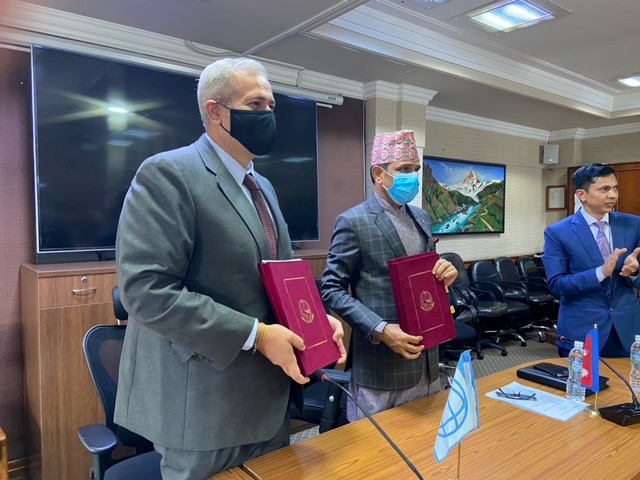
Nepal Government and the World Bank have signed two separate additional financing agreements of $50 million each to support the implementation of the government’s flagship School Sector Development Program in the education sector and public management reforms in the health sector.
The agreements were signed by Finance Secretary, Madhu Kumar Marasini on behalf of the Government of Nepal, and World Bank Country Director for Maldives, Nepal, and Sri Lanka, Faris Hadad-Zervos on Wednesday.
Strengthening Nepal’s education and health systems is an essential element of building back better from the pandemic,” said Madhu Kumar Marasini, Finance Secretary.
“The reform agenda championed by the Nepal Health Sector Program for Results is critical to Nepal’s vision of an efficient, effective, transparent and accountable health system, and together with the School Sector Development Program, provides a catalyst for improved human capital development enabling Nepal to compete strongly post-COVID.”
The Additional Financing to the School Sector Development Program will help reduce dropouts and mitigate learning losses by supporting pro-poor targeted scholarships, pro-science scholarships, and catch-up programs, as per a statement issued by the World Bank.
“It will lay the foundation for the next school sector successor program in two areas – assessment and data systems, and help create the fiscal space to fill the gap in financing the government’s flagship program.”
“The Additional Financing for Nepal Health Sector Management Reform Program for Results will support the original Nepal Health Sector Management Reform Program for Results implemented under the leadership of the Ministry of Health and Population. It spearheads reforms in public procurement, financial management, data for decision making and citizen engagement for greater accountability in the health sector.”
“These engagements contribute to Nepal’s green, resilient, and inclusive development by making the country’s education and health systems more inclusive and resilient to future shocks, which will in turn help to accelerate human capital development,” stated Hadad-Zervos, World Bank Country Director for Maldives, Nepal, and Sri Lanka.
“I am very hopeful that that the additional financing will help propel Nepal closer to its goal of universal health coverage, and ensure equitable access and improve the quality of education and learning outcomes for children and young people in Nepal.”
Similarly, the Swiss government has agreed to provide grant assistance of Rs 1.88 billion to the government of Nepal as part of continuation of the second phase of the Enhanced Skills for Sustainable and Rewarding Employment (ENSURE-II) project in Nepal for the next four years.
The ENSSURE-II project will continue to scale up apprenticeships, a formal programme within the duration of two years, which is also a sustainable model in the Technical and Vocational Education and Training sector.
It will also continue to offer short courses with on-the-job training, skill upgrading training for existing workers, Occupational Health and Safety at the workplace as well as career guidance for youths.
The project will further enhance collaboration between the education sector and employers and thereby contribute to sustainable and rewarding job prospects for Nepali youths. The project will benefit a total of 70,000 people.
The project will be implemented by the governments of Province 1, Bagmati, and Lumbini in close collaboration with the Council for Technical and Vocational, Education and Training at the federal level.
Chief of International Economic Cooperation Coordination Division of the finance ministry Dhaniram Sharma said the Swiss government would provide the grant assistance to impart technical and vocational training to unemployed youths of the country.
Sharma said development of human resources was crucial to realise socio-economic transformation. “I believe this project will support to develop a skilled, competitive and creative human resource and ensure the opportunity to have gainful employment, provide career guidance service for Nepali youths and meet the needs of business and industries so as to achieve skilled human resource.”





